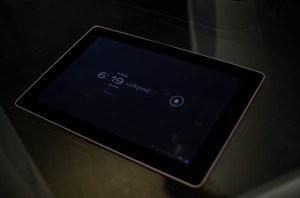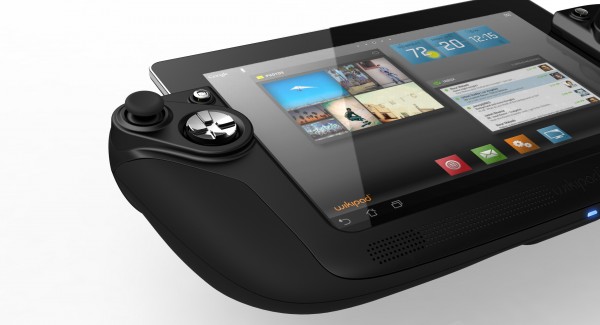
There are tablets, and then there’s a gaming tablet. The Wikipad, an Android handheld that promised to be the first mobile device with a gamepad built specifically for the device, is set to launch later this year. Venturebeat recently sat down to talk with CEO James Bower and President of Sales Fraser Townley in a local design office in Thousand Oaks, Calif.
Here’s an edited version of our interview. For details on the Wikipad’s specifications, see our report from late last month.
Venturebeat: What is Wikipad, and what is the history of the company?
James Bower: Last year we (Bower, Matt Joynes, and one more founder) started thinking about what type of consumer device could make a difference. What’s something that we could do that would really get good market acceptance as well as being a game changer?
We all started getting smartphones and tablets and we’re playing games and whatnot, and it just doesn’t quite have that experience as when you’re playing with a controller. The touch experience is okay, but it doesn’t quite get you there. So we thought what can we do to take the concepts of tablets and create a much better gaming experience.
VB: When did the company get started?
JB: We officially formed the company in September. But as a team, we’ve been thinking through concepts, I would say, since back in the spring of 2011.
VB: What was the team doing back then if it wasn’t a company?
JB: Matt [Joynes], who is the chairman of the company, previously bought and sold companies. He and I partnered up on this, and he was twiddling with some of the business planning of creating a consumer device. I was involved with the restructuring of a company called Master Image, which was acquired and restructured and moved to California. That company created stereoscopic 3D for cinema and screens for tablets and smartphones.
 The market dabbled in [3D in mobile devices] for a little bit. We saw LG come out with its 3D version (the LG Optimus 3D) of a phone, and the Nintendo 3DS, but there hasn’t been a tremendous market push to adopt this from a tablet and smartphone perspective. In some cases, from my standpoint frustratingly so, anyone who loves stereo sees this as a huge potential market that hasn’t really been opened yet. We see this in the television market; most TVs support stereoscopic in some form, and we see a lot of the market shifting to that.
The market dabbled in [3D in mobile devices] for a little bit. We saw LG come out with its 3D version (the LG Optimus 3D) of a phone, and the Nintendo 3DS, but there hasn’t been a tremendous market push to adopt this from a tablet and smartphone perspective. In some cases, from my standpoint frustratingly so, anyone who loves stereo sees this as a huge potential market that hasn’t really been opened yet. We see this in the television market; most TVs support stereoscopic in some form, and we see a lot of the market shifting to that.
The fact is, there’s a lot of 3D content that is still coming out. What’s different when it comes to a personal device, when you don’t have the challenges of putting glasses on that becomes a socially inhibiting event — you know, you’re not going to sit with friends and put glasses on in your house. It’s a little bit awkward. When you remove that barrier and enable stereoscopic 3D, it starts to change.
VB: So the original idea was to have the Wikipad be a stereoscopic tablet, and as time went on the 3D got pushed out?
JB: Yes, but it’s more than that. It’s the nature of how fast we can get to market with the price points that we need to get with the market research we’ve done, you know, for the first version [of the Wikipad]. [3D] is in our DNA, if you will, and in our future plans.
VB: Why the name “Wikipad? What exactly does that mean?
JB: ‘Wiki’ actually means fast [in Hawaiian], and so we were thinking about what are we going to create here? We’re going to create a tablet that’s really fast, that’s really edgy for the gaming community, and ‘wiki’ is such a representative name of what we want to be, which is a fast pad. And it’s catchy. Sometimes there’s an educational tone associated with it, and if we come out with a tablet that people may think has educational benefits as well, we start to hit a brand that’s accepted across a lot of mediums.
VB: If I’m not mistaken, you’re currently partnered with NVIDIA, as well as Gaikai. Does that mean Sony as well now, since they purchased Gaikai?
JB: Gaikai has been a great relationship for us, but we’re under NDA with Gaikai and Sony. That’s about all I can say right now, but we know what’s going on and we’re still close to the situation, and the transaction is just in the completion stage as we speak. Stay tuned.
VB: What about Sony Mobile Certification, where Playstation titles can play on some Android devices, mostly from Sony and now some select HTC smartphones?
JB: Sorry, I can’t comment.
 VB: Fair enough. So you’re working with NVIDIA as well. Why go with Tegra?
VB: Fair enough. So you’re working with NVIDIA as well. Why go with Tegra?
JB: For a number of reasons — a few secret ones that I can’t talk about, and a few that I can. When it comes to a brand of processor that is close to the hearts of gamers, NVIDIA has been there a long time. They have a very good, integral brand; they have a very good relationship to content, and content is key for us, as it relates to our product. So there are a lot of advantages to Tegra as it relates to gameplay. They’ve been working on a lot of things behind the scenes that they haven’t talked about regarding gameplay. They also were one of the front-runners in the development of stereoscopic 3D support, integrating their 3D vision capabilities into the Tegra processor as well. So it became much more of a turnkey easy solution for our future as we look at stereoscopic 3D.
VB: So you’ll be working with them for 3D support?
JB: Yes.

